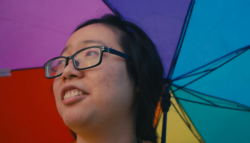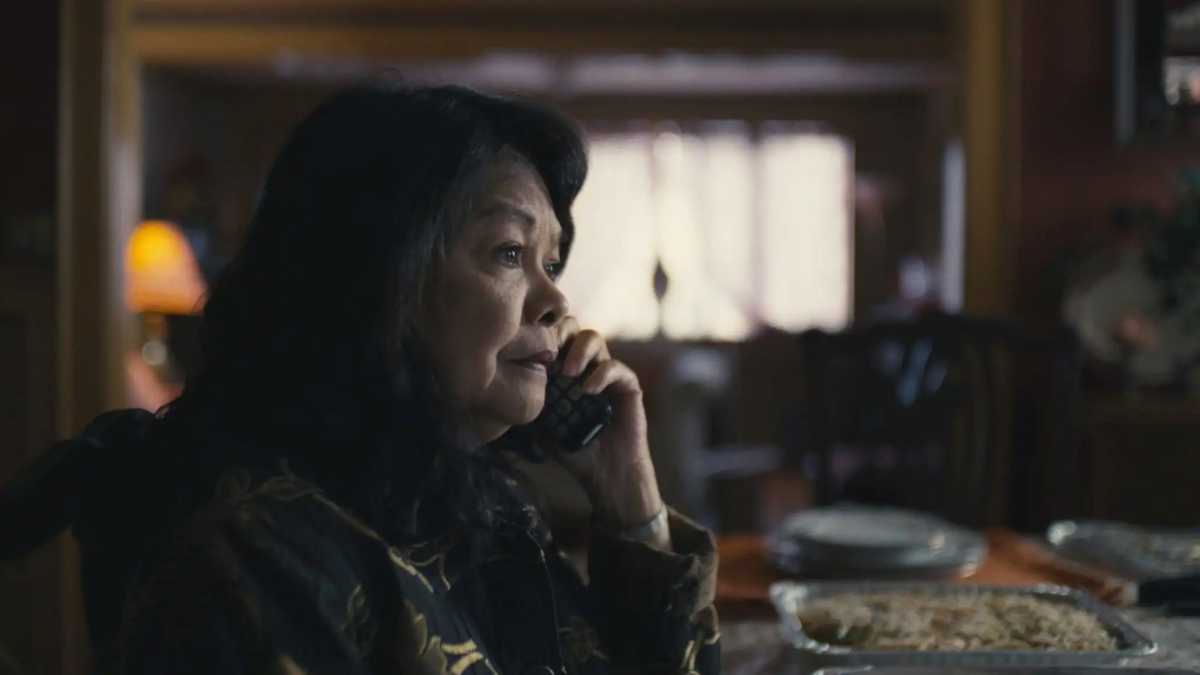Without diaspora, there is no Asian American Pacific Islander identity. Someone, somewhere, moved halfway across the world. In a world where we are always searching for either belonging or connection, where do we find a place for ourselves?
TUO TUO (陀陀)
Watched by: Susan Xing
“Tuo Tuo” by An Chu takes the viewer on a journey to the Taiwanese countryside with a family deer farm serving as the setting of our story. The family portrayed finds an important source of income from the harvesting of male deer antlers due to its popular use: It is ground or stewed for health benefits. In Chu’s short film, the complex interplay between belonging, identity, and value is explored through Hai’s (Sean Huang) relationship with his favorite deer, Tuo Tuo.
This relationship begins with Hai as a young boy racing through the deer pens until he stops to marvel at one in particular, Tuo Tuo – a deer with a gentle nature and beautiful antlers. It is Tuo Tuo’s antlers that go on to cure Hai’s own childhood illness, intertwining the two’s destinies. Views of the grassy, idyllic landscape are interlaced with more visceral scenes of antler stumps weeping with scarlet droplets, the low vibrato of a saw humming in the background. However, as Tuo Tuo’s ability to regrow antlers declines over time, his swift replacement is a reminder of how his worth is ultimately tied to his utility on the family farm.
As Hai, in parallel, is ordered around by his family to complete tasks around the farm, one wonders how much of Hai’s identity and worth is also connected to his productivity. Hai’s sense of belonging to the farm, and to his very own family, are not simply formed by his blood ties. Expectations – whether cultural, economical or political – are all tacit underpinnings of our sense of belonging to the people around us.

(Image Credit: Hao Zhou)
HERE, HOPEFULLY
Watched by: Jacqueline Grogan
For “Here, Hopefully”’s subject Zee, a non-binary, international student from China, the “here” in question is the American Midwest – more specifically the University of Iowa, where they are studying to become a registered nurse. This documentary, directed by Hao Zhou, follows Zee through grueling and glorious seasons as they try to obtain a work visa to build their life in this country, while navigating what it means to be here, as a queer immigrant. It’s just over 11 minutes long, but you’ll fall for Zee’s charisma and sincerity much sooner than that.
Zhou creates a vast, sprawling picture by hyperfocusing on the details of Zee’s daily life: their motivational printouts austerely Scotch-taped to the wall, their 100mg Zoloft prescription, their DIY seed starter from which they grow their food, the “restaurant meal” they treat themself to after passing their licensure exam, their interactions at the Iowa City pride parade, their rainbow umbrella. All of these subject-specific images, enriched by Zee’s personal voiceover, come together pointillistically to create a universal image of loneliness, joy, perseverance, and optimism.
Still, Hao is clear in their direction to keep the film’s focus on the queer international student in the Midwest, whom he met at their Iowan alma mater (Zhou uses both he and they pronouns). “Oftentimes when Americans are thinking of Chinese international students,” Zhou mused, “they are thinking about crazy, rich Asians in NYU or UCLA… that the parents just send them here to get a diploma, and then they will go back to inherit their wealth… That’s not the case of many, many other Chinese students here.”
Though Zee struggles to find a job in the U.S. that would guarantee a work visa to foreign nurses, despite having graduated from one of its top nursing schools, “Here Hopefully” has become a documentary I turn to when in the mood for hope and empowerment.
MOTHERLAND
Watched by: Susan Xing
To be Korean American means to embody the identity of both labels, ‘Korean’ and ‘American.’ Yet, this simple identifier proves deceptively complex for Korean adoptee Leah Evans (Tiffany Chu) in Christina Yoon’s short film, “Motherland.” With relentless determination, Leah journeys to Korea in search of her birth mother (Minae Oh), encountering an unhelpful adoption agent and an unwilling uncle Seong-Jin (Taewoo Kim) along the way.
It is clear that in Korea, Leah is not really ‘Korean’ in the way she might be assumed to be back in America. Leah does not speak Korean, nor does she have any memories of living in Korea. She relies on the kindness of strangers and her found brother, Minjae (Hong Kyung), to serve as liaisons in navigating an unfamiliar land of booming night clubs and overcast skies. But in her search for the truth and her own roots, Leah discovers that the deeper she digs, the further she finds herself from understanding the ‘Korean’ part of her identity.
BALIKBAYAN
Watched by: Christson Luigi Asuncion
There are many reasons to leave your home country, and just as many reasons to return. Over time, you realize the sacrifice it took to get where you are, as well as how much everyone has grown around you. For Cecile, the main character of Rebecca Rajadnya’s short film “Balikbayan,” this realization comes at a time when she feels her loneliest.
Unable to connect with family in the Philippines or her daughters who have moved out, Cecile’s life on her own has become a dull routine. All she can do is make long distance phone calls and send balikbayan boxes – a box Filipino immigrants send back home, typically containing household goods, clothes, toys, special requests such as karaoke machines, etc. Occasional visits from her daughters have become stale, with only glimpses of conversation. With the Philippines feeling farther away than ever, Cecile realizes that she has become disconnected from her home and her daughters, leaving her yearning for a new feeling of home. At the end of the day, sometimes you just need to bust out a karaoke song by yourself to really express how you feel.
WHERE NO ONE LIVES
Watched by: Jacqueline Grogan
If an apartment exists where no one lives, can it emanate life? If separated only by a wall, are we ever truly alone? Li Anne Liew answers yes and no – respectively – in her coming-of-age comfort film, “Where No One Lives,” about the individual and intertwined stories of new and long-time neighbors in an apartment building. Our residents include young Zela (Jackie Takarabe) and her older brother Kai (Brandon Halvorsen), whose tension is palpable as he departs for college – not first without trying to resolve their emotional distance; a newly 60-year-old Margaret (Marina Chung), who regrets spending her birthday with nagging siblings; and Rory (Stacy Chu), who’s new to the building and chasing her dreams, while sending her mom to voicemail.
Originally from Malaysia, which she describes as having a strong sense of collectivism, Liew has lived in her fair share of tiny apartments in big cities across the world since then, where she experienced a new kind of isolation. From that urban alienation, however, she found what would become the inspiration for her short film – “a shared community over this loneliness,” the filmmaker explained.
“I think neighbors are kind of the easiest way to form community,” Li Anne mused. “You don’t really know them, but they kind of offer a lot of help to you.” About her own neighbors, whose faces and names she often never knew, the Asian director who moved west says she felt comforted by overhearing their favorite TV shows on repeat, their dinner parties, and even the mutual silence. “Sometimes they’d be alone, and sometimes I’d be alone,” she shared, which is where she felt community the most.
Check out Li Anne Liew’s “Where No One Lives” to get a gorgeously colored taste of that community.
TUĪ NÁ (推拿)
Watched by: Christson Luigi Asuncion
Tuī ná (translated as to pinch and pull), is a traditional Chinese massage recommended to reduce back pain. Through all the stresses of life, physical touch can be the best remedy for your body; however, a massage can only go so deep. In William Duan’s short film “Tuī Ná,” the massage becomes less traditional in order to find a comfort within.
Sometimes, the more intimate and familiar moments are the ones that bring the most comfort; resting your head on your mother’s lap can feel like a massage. It alleviates the confusion and anxieties that come about in life. Duan’s film demonstrates this feeling through a son exploring their queer identity and their grieving mother’s expectations. Through their experiences, both characters crave specific signs or sensations they think they need to cope. When nothing is working, they find solace through familial touch. Even if we cry about nothing, we can find comfort in our own tuī ná.
The “This Must Be the Place” shorts block screened at the 45th Asian American International Film Festival.

